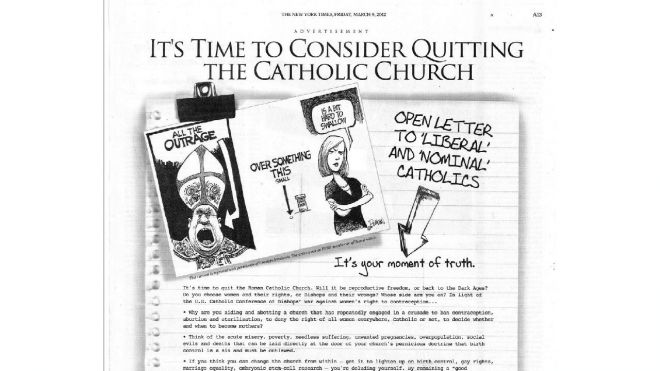… I’m no legal expert or canon lawyer but this sounds like quite a stretch;
Last month, South Dakota passed a law that seeks to prevent the enforcement of “any religious code.” The very brief bill stated simply: “No court, administrative agency, or other governmental agency may enforce any provisions of any religious code.”
It seems quite innocuous, but clearly, it was intended to target the threat of sharia law. In many other states, similar laws do not mention sharia explicitly, but rather “foreign law” or “foreign codes.” As many have pointed out, this is a solution looking for a problem, as nowhere in America are Muslims seeking to supplant the Constitution with sharia law. If you think about this and delve into South Dakota’s law and similar laws in other states, one thing starts to become clear: Leaving aside the fact that these laws are discriminatory by their very nature, any law that bans “foreign codes” should cause Catholics to take heed.
That is because the Holy See, which is the source of Catholic canon law, resides in the Vatican, a city-state that is a sovereign, independent country. Thus, technically, Catholic Canon Law is a “foreign code” or “foreign law,” and those state laws that prevent courts from enforcing or taking “foreign laws” into account should also then apply to Catholic Canon Law. [SOURCE]
My understanding is those looking to impose sharia law want separate courts to enforce their religious laws. You know, to protect people that carry out honor killings and junk. Sharia law looks to circumvent laws that everyone else has to follow by claiming a religious exemption, like exempting women in burqas from TSA pat downs. Catholics haven’t called for separate legal systems and we still follow civic laws so I don’t follow the extreme leaps in logic of this statement, from the same article;
This is significant because any marriage officiated in a Catholic Church under Catholic religious rules cannot be enforced by the courts if anti-Sharia bills become law. Couples need to get a marriage license, but if they choose to have, for example, a Catholic religious ceremony—which brings the marriage into being—in a church rather than a courthouse, then those marriages are performed using a “foreign law.”
If, God forbid, such a couple were to then divorce, the court cannot do anything because the marriage was officiated with a “foreign law.” If one spouse were to die, the court would not be allowed to enforce the deceased’s will, because, again, the marriage was officiated using “foreign law.” If a spouse is sick and incapacitated in a hospital, how can the health care providers take the spouse as a surrogate decision maker if, in the first place, the marriage cannot be enforced because it was officiated using “foreign law”?
Um… yeah.
I guess one could make a connection with anti-sharia bills and Catholics current fight against the HHS mandate, but I see our fight as one against the government looking to impose laws preventing us from practicing our religion. Anti sharia bills, as I understand it, are about preventing foreign religious groups from establishing their own laws and legal systems that trump pre-existing civil laws and prevent those laws from being upheld. That’s a significant difference. When Catholics get divorced we get divorced in the same courts as everyone else so I fail to see the connection this author is trying to make. In all honesty, it just sounds like he is trying to win support – support I will never ever ever give – for the idea of sharia law being established here in the US by creating a strange series of events that may or may not effect Catholics.
Again I am no legal expert or canon lawyer so I ask, do you think the intentionally vague language of the bill could be a threat, because I don’t. But I would love to hear your take on it since I am obviously biased and suffer from bouts of misanthropic xenophobia.
Sound off.
PS – To be very very clear, I would like to add that I will never ever support sharia law here, or anywhere for that matter, due to the heinous and vicious persecution suffered by Christians living in Muslim dominated countries where sharia law is practiced. It is this author’s very strong belief and opinion that Islam is not a religion of tolerance and peace. Suggesting a discussion on this topic does not imply I think sharia law is OK or that I entertain the slightest possibility that sharia law should be upheld in US.











